Marriage

The limiting of religious freedom is a perpetually contested question in American public life. Most recently, as states consider new laws and the U.S. Supreme Court prepares to rule on same-sex marriage, gay rights supporters and traditionalist Christians appear to be on a collision course.
To make matters worse, whenever disputes between gay couples and conservative Christian wedding vendors arise, a well-funded professional grievance industry sends lawyers and media handlers out to convince the public that this is the great civil rights issue of our time.
As a new prevailing cultural consensus on homosexuality displaces a former one, it remains to be seen how the winners will treat the losers. From laws that impose punitive fines to rhetoric that places “religious liberty” in quotation marks so as to diminish it, the culture war’s apparent victors have not accorded religious freedom its due place of prominence in our public life.
The present tension between religious liberty and LGBT rights is unsustainable, but it is not insurmountable. Activists on both sides have been short on empathy for each other. Leaders have every incentive to portray their opponents as evil retrogrades hellbent on destroying society.

Rob Bell was once the evangelical It Boy, the hipster pastor with the thick-rimmed glasses and the skinny jeans whose best-selling theology was captured in books with names such as “Velvet Elvis” and “Sex God.”
By 2006, the Chicago Sun-Times wondered aloud whether the Michigan megachurch pastor could be the next Billy Graham.
And then he went to hell.
In 2011, his book “Love Wins” pushed the evangelical envelope on the nature of heaven, hell, and salvation. Many dismissed him as a modern-day heretic, unwilling to embrace traditional evangelicals beliefs about the hereafter.
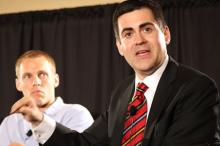
Prominent U.S. evangelicals Russell Moore and Rick Warren blasted the sexual revolution at a Vatican conference Nov. 18 and said it is destroying the institution of marriage.
Moore, the public face of the Southern Baptist Convention, said sexual liberation had created “a culture obsessed with sex” that had simply led to a “boredom of sex shorn of mystery.”
“Western culture now celebrates casual sexuality, cohabitation, no-fault divorce, family redefinition and abortion right as part of a sexual revolution that can tear down old patriarchal systems,” Moore told a global gathering of leaders from Catholic, Jewish, Muslim, and other faiths as part of the “Complementarity of Man and Woman” conference convened by Pope Francis.
The Southern Baptist ethicist said the sexual revolution appeared to have imposed a new patriarchy that enabled men to “pursue a Darwinian fantasy of the predatory alpha male” for the pursuit of “power, prestige, and personal pleasure.”
“Does anyone really believe these things will empower women and children?” he asked. “We see the wreckage of sexuality as self-expression all around us, and we will see more yet.”

When Southern Baptists convened a national conference in Nashville, Tenn., this week to discuss issues of human sexuality, bringing conservative evangelicals and LGBT Christian activists into the same ballroom was a recipe ripe for potential fireworks.
Perhaps the most shocking thing was how few fireworks there were.
The Southern Baptist Convention’s Ethics and Religious Liberty Commission was clear: Sex is reserved between a man and a woman within the bonds in marriage. And openly gay evangelicals in attendance were equally clear: Homosexuality is not incompatible with Christianity.
No concessions were made, but leaders on both sides expressed surprise at how the two agreed to coexist. Put another way: The old emphasis on “Love the sinner, hate the sin” has become more a version of simply “Love all sinners. Ask questions later.”
“I do want to apologize to the gay and lesbian community on behalf of my community and me for not standing up against abuse and discrimination directed towards you. That was wrong and we need your forgiveness,” said North Carolina megachurch pastor J.D. Greear, drawing applause.
“We have to love our gay neighbor more than our position on sexual morality.”

In the past few months I have come to a rather substantial conclusion: I cannot slow down time. Try as I might, my oldest daughter is now four and a half and is practically sprinting her way to "big kid school." My wife and I have been discussing this next phase of our daughter’s life. Sadly, school districts are falling into massive debt, being subjected to low performance in the classroom and even apathy in educating the next generation. Schools have become too focused on state test scores and benchmarks and have removed the art of learning from many classrooms.
Now private schools are becoming more mainstream, offering alternatives to public education, more flexibility, and more opportunities to the students. For many private schools there is a common element: they are associated with a religious group or Christian denomination. These schools started out as an extension of the ministry of the church as a way to respond to the needs of the community. But over time many popped up as a rejection of the educational system and their "removal" of God or prayer the school. Many parents see disconnect between the mainstream educational system and their Christian households.
But I see a certain danger in some of these Christian alternatives. It might sound counterintuitive for an ordained Christian minister to say, but there are a few reasons I would not send my daughter to some Christian schools.

Public disagreements over whether the Roman Catholic Church can change its teachings on Communion for remarried Catholics are growing sharper on the eve of a major Vatican summit, with conservatives led by U.S. Cardinal Raymond Burke making another push against loosening the rules.
In a conference call with reporters on Sept. 30, Burke, who currently heads the Vatican’s high court, singled out the leading proponent of reforms, German Cardinal Walter Kasper, and his claims that critics of his proposals are really attacking Pope Francis.
Kasper has said that the pope supports his efforts to find ways to fully reintegrate divorced and remarried Catholics into church life. The proposals have become a prime focus of the upcoming Vatican meeting, called a synod, which will convene on Oct. 5 for two weeks to consider changes in family life in the modern world.
“I find it amazing that the cardinal claims to speak for the pope,” said Burke, the former archbishop of St. Louis, speaking from Rome. “The pope doesn’t have laryngitis. The pope is not mute. He can speak for himself. If this is what he wants, he will say so.”

Pope Francis made headlines this week when he officiated at the weddings of 20 couples, including some who had been living together and a woman who has a daughter from a previous relationship.
It was the first time that the Argentine pontiff had presided over a marriage ceremony since his election and it may have also signaled a dramatic shift in Catholic Church doctrine.
Now five conservative cardinals appear to be hitting back.
In a new book to be released days before the world’s Catholic bishops gather at the Vatican for their October Synod, the hard-liners are challenging moves to moderate church doctrine on marriage and offer Communion to divorced Catholics who remarry.
The book, Remaining in the Truth of Christ: Marriage and Communion in the Catholic Church, will be published in five languages, including English and Italian, on Oct. 1.

There’s something romantic about a pair of lovebirds on the lamb, fleeing the authorities to keep their love alive. But add a few more wives, and not so much. When the first episode of “Sister Wives” aired on TLC featuring the poly-union of Kody Brown and his four co-star wives, Utah police announced the very next day that they would investigate the illegal union. Brown promptly relocated his brood to Nevada, leaving one intolerant state for another where polygamists are allowed to run free, and from there filed a complaint in a U.S. district court challenging the law that spurned their love.
After years of struggle, last month a Utah judge struck down the state’s polygamy law , decriminalizing poly-unions in the state that has endured a relentless barrage of polygamy punch lines, even during the decades where it was expressly verboten. The case will now advance to an appeals court, but conservative harbingers are already offering “I told you sos,” largely bemoaning the slide down the slippery slope of morality opened by same-sex unions.
But is morality the only way to talk about marriage and sex? Certainly the American judiciary thinks otherwise as it hammers out the constitutionality of every union under the sun. The polygamy question could broaden the discussion among evangelicals to include nuances beyond morality.
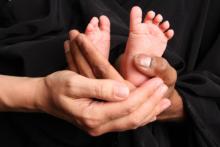
Nearly three in five births to unmarried women across the United States were to women living with their partner — marking the first time a majority of these births were to women in cohabiting relationships, according to a new analysis of federal data released Wednesday.
The increase was sharp; the percentage of nonmarital births within cohabiting relationships rose to 58 percent from 41 percent in just a few years, says the report, based on various data sources from the National Center for Health Statistics, collected between 2002 and 2013, the most recent available.
“What’s happened is the percent of nonmarital births within cohabiting unions has been increasing, but now it’s increased to the point where the majority of nonmarital births are to women that are cohabiting,” said Sally Curtin, the report’s co-author.
While the births in cohabiting relationships increased, the number, rate, and percentage of births to unmarried women overall declined during the same period.
In 2013, the total of 1,605,643 births to unmarried women was the lowest since 2005. The birthrate for unmarried women has steadily declined.

When Philadelphia’s St. Paul Baptist Church hired the Rev. Leslie Callahan as its first female pastor, in 2009, she was nearing her 40th birthday and the tick-tock of her biological clock was getting hard to ignore.
She delighted in her ministry but also wanted a husband and children in her life. The husband she couldn’t do much about — he just hadn’t stepped into her life.
Now Callahan is mother to 22–month-old Bella, who was welcomed joyously by what the pastor describes as “a pretty traditional Baptist church.” She describes Bella’s arrival as “a divine regrouping,” a different answer to her prayers than the traditional mommy-daddy-baby model she had envisioned.
Ever since unmarried sitcom anchorwoman Murphy Brown shocked much of the country in 1991 by deciding to raise her baby on her own, the culture has changed. Once unthinkable and later unacceptable, single mothers by choice today are met with less judgment.
In fact, according to federal statistics, more than 40 percent of births are to unmarried mothers. But what if, like Callahan, the single mom by choice is a minister, or a rabbi?

The Utah attorney general announced Wednesday that he will go straight to the U.S. Supreme Court to challenge an appellate ruling that declared the state’s ban on same-sex marriage unconstitutional.
Attorney General Sean Reyes decided to leapfrog the full 10th U.S. Circuit Court of Appeals in Denver after a three-judge panel last month upheld a lower-court ruling and declared that the U.S. Constitution’s guarantees of equal protection and due process extend to gay men and lesbians who want to marry. It was the first time a federal appeals court had ruled on the issue.
Besides Utah, the June 25 decision applies to Colorado, Kansas, New Mexico, Oklahoma, and Wyoming, but the circuit court put its ruling on hold, pending appeals.
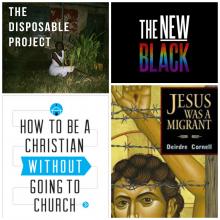
THROUGH THEIR EYES
In 2011, Raul Guerrero provided 100 Kodak disposable cameras and taught basic photography skills to nine young students in the Newlands area of Moshi, Tanzania. The Disposable Project book brings together their images of their community, with text by Guerrero. the-disposable-project.com
JOURNEYING
“Migration has been, for centuries, not only a source of controversy but a source of blessing,” Deirdre Cornell writes in Jesus Was a Migrant. Inspired by ministering among immigrants in different settings, this is a beautifully written set of deeply humanizing reflections on the immigrant experience and Christian spirituality. Orbis Books

Nine days after my Dad’s memorial service on June 7, I am still in Detroit.
I am still in Detroit to volunteer as a member of the More Light Presbyterians communications team at the 221st General Assembly of the Presbyterian Church (USA).
I am still in Detroit because, for the better part of three decades, my father was an active member of the progressive movements within PCUSA for affirmation and inclusion, for peace with justice.
I am still in Detroit because my dear friends who got married on my former land in rural Tennessee could not have their vows acknowledged by church or state because they are both men.
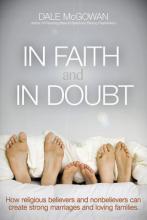
If interfaith marriages are supposedly doomed, Dale McGowan’s should have been toe-tagged from the start.
He’s a committed atheist; his wife comes from a line of Southern Baptist preachers. Yet 23 years and three kids later, they are still happily married.
“The key is to talk about your values,” McGowan said from his home in Atlanta. “A lot of time we mix up the words ‘values’ and ‘beliefs.’ Beliefs are what you think is true about the universe. Is there a God? Where do we go when we die? But values are what you believe are important and good. When you get couples talking about values they find out they share a tremendous amount, even if they don’t share beliefs.”
That’s what McGowan and his wife, Becca, did. While she believed in one God, she did not believe salvation could be had only through belief in Jesus. And he agreed that he could go to church with her — and did, for many years, with their children.

Khatoon Shaikh had no formal education, never worked outside the home, and lived in the kind of neighborhood that many people might call a slum.
But when Shaikh witnessed her sister-in-law victimized, first at the hands of a violent husband, and again by a patriarchal justice system, she took charge.
Shaikh started her own Shariah adalat, a court based on Islamic law, just for women.
“We needed a place where women’s voices could be heard,” the mother of seven said.
That was 20 years ago. Since then, the court has moved from Shaikh’s home to a two-room office in the north Mumbai neighborhood of Bandra. And it now operates within a broader organization called BMMA, or Indian Muslim Women’s Movement, which Shaikh helped form in 2007.

Most of the women I know mourn the loneliness, the lack of physical touch, the empty half of the bed, and the “table for one, please” that come with being single. I know from experience how easy it is to live as a lady in waiting — waiting for a man to come along and rescue you from the boredom and loneliness of life, waiting for a man to validate you as an adult, waiting for a relationship to unlock the door to opportunities like church leadership, full-time ministry, entrepreneurship, foster care, financial stability, or international travel.
I know many women whose prayers mainly consist of praying for God to bring them a spouse, and whose waking thoughts often wander into the injustice and unfairness of singleness. They wonder if God really knows how much they long for a husband and a family. They keep telling God that if He’ll only grant them a mate, then they’ll be content and more able to obey.
But the Bible — and most of church history — affirms the benefits of being single. Paul says it’s preferable because you can travel lightly and give yourself more fully to ministry. Valentine’s Day itself was named after a saint who was single, and was martyred for his faith on Feb. 14, 270 A.D.

On Valentine’s Day, American husbands and wives of every age, faith, and region will shower their beloveds with symbols of undying affection — flowers, chocolates, moonlit dinners, kisses.
The annual Feb. 14 lovefest is also a popular time for elaborate engagements, with picturesque proposals and pricey jewelry.
But any link between love and matrimony is relatively recent, said Stephanie Coontz, who teaches history and family studies at the Evergreen State College in Olympia, Wash.
And a radical one at that.

Call me old fashioned, but our culture hit a new low at the Grammys when 33 couples were married. Some of them were gay and lesbian couples.
Indeed, it was a bad day for marriage.
First, Macklemore sang "Same Love," then Queen Latifah officiated a wedding for 33 couples, and then Madonna sang her 1986 single "Open Your Heart."
Now, don’t get me wrong. I love Macklemore’s Same Love. I love its pro-same-sex marriage message because of my Christian faith, not in spite of it. I’ve written about why Christians should embrace same-sex marriage here, here, and here, but Macklemore’s theological argument in the song is as good as any.
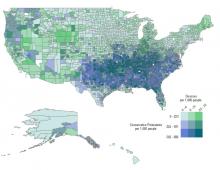
Conservative Protestants in red states aren’t the only ones seeing high divorce rates — so are their neighbors, according to a new study.
Researchers found that simply living in an area with a large concentration of conservative Protestants increases the chances of divorce, even for those who are not themselves conservative Protestants.
According to researchers who took into account race, income, and other factors, marriage and fertility trends that are common among conservative Protestants — younger marriage, more kids, less higher education — affect all people in areas most populated by conservative Protestants, no matter their personal religious affiliation.

The only way to win the “war on poverty” is for liberals and conservatives to make peace — for the sake of the poor. That would be the best way to mark the 50th anniversary of the war on poverty, declared by President Lyndon Johnson in his January 1964 State of the Union address. Making peace means replacing ideologies with solutions that actually solve the problems of poverty. With both Republicans and Democrats speaking out on poverty this week, and the recession slowly receding this should be an opportunity to find the focus, commitment, and strategies that could effectively reduce and ultimately eliminate the shameful facts of poverty in the world’s richest nation.
For any proposal, the basic question must be whether it helps more people and families rise out of poverty and realize their dreams. This means setting aside political self-interest and thinking beyond our too often inflexible ideologies.